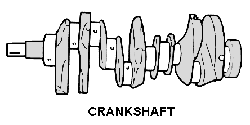The
conservation of energy states that energy can't be created nor
destroyed but can change into many different forms. Heres a few
forms of enery to start off with, electrical, chemical, stored,
potential, kinetic, nuclear and it seems like the list can go on
forever.
Now what does the conservation of energy have to do with a car? Well for one a car needs energy to start moving and to keep moving. Also people complain about gas milieage alot and are complaining that a good amount of energy is lost. Unfortunetly they are wrong when they say energy is being wasted considering it can't be created or destroyed but it does seem like there isn't enough energy to take the car anywhere. The fact is that most of the energy is converted into thermal, sound, and electrical energy and very little is converted into kinetic energy. If anybody can figure out how to convert most of the energy from gasoline into kinetic energy they would become rich and famous.
For a car the energy frist starts out as chemical energy in a form of gasoline or diesel. From the fuel tank the gas mixes with the air by turning into a vapor and enters the cylinder where a piston is located. Then a spark(electrical energy) is made by a spark plug and ignites the air fuel mixture sending the pistion downward with a great amount of force. When that piston goes down it rotates a crankshaft that is connected to all of the pistons found in the engine of a car. The crankshaft turns more devices which eventually turn the drive shafts that turn the axles and then finally the rotors sending the car into motion. This is not all along the way a lot of the energy is turned into thermal energy giving a good reason to have oils and coolants for the engine.
 http://www.familycar.com/Engine.html
http://www.familycar.com/Engine.html
 http://www.familycar.com/Engine.html
http://www.familycar.com/Engine.html
One area where heat is a problem is where the pistons continually move up and down to rotate the crankshaft. Here oil is needed to reduce friction to allow the pistons to move up and down a bit more freely. Since friction is reduced heat is also reduced. When the gas ignites in the cylinder more thermal energy is ignited and it is generally released as exhaust. Of course sound energy is formed also from the small explosions in the cylinders, it would be very awkward to have an engine with no sound.
In the end none of the eneryg is truelly wasted, it just didn't quite make it into the form of energy the auto maker needed it to be to make the car efficient enough to keep money from jumping out wallets world wide.
Now what does the conservation of energy have to do with a car? Well for one a car needs energy to start moving and to keep moving. Also people complain about gas milieage alot and are complaining that a good amount of energy is lost. Unfortunetly they are wrong when they say energy is being wasted considering it can't be created or destroyed but it does seem like there isn't enough energy to take the car anywhere. The fact is that most of the energy is converted into thermal, sound, and electrical energy and very little is converted into kinetic energy. If anybody can figure out how to convert most of the energy from gasoline into kinetic energy they would become rich and famous.
For a car the energy frist starts out as chemical energy in a form of gasoline or diesel. From the fuel tank the gas mixes with the air by turning into a vapor and enters the cylinder where a piston is located. Then a spark(electrical energy) is made by a spark plug and ignites the air fuel mixture sending the pistion downward with a great amount of force. When that piston goes down it rotates a crankshaft that is connected to all of the pistons found in the engine of a car. The crankshaft turns more devices which eventually turn the drive shafts that turn the axles and then finally the rotors sending the car into motion. This is not all along the way a lot of the energy is turned into thermal energy giving a good reason to have oils and coolants for the engine.
 http://www.familycar.com/Engine.html
http://www.familycar.com/Engine.html
 http://www.familycar.com/Engine.html
http://www.familycar.com/Engine.htmlOne area where heat is a problem is where the pistons continually move up and down to rotate the crankshaft. Here oil is needed to reduce friction to allow the pistons to move up and down a bit more freely. Since friction is reduced heat is also reduced. When the gas ignites in the cylinder more thermal energy is ignited and it is generally released as exhaust. Of course sound energy is formed also from the small explosions in the cylinders, it would be very awkward to have an engine with no sound.
In the end none of the eneryg is truelly wasted, it just didn't quite make it into the form of energy the auto maker needed it to be to make the car efficient enough to keep money from jumping out wallets world wide.
| Home Page |
Tires | Horse Power |
F=Ma | Bibliography |